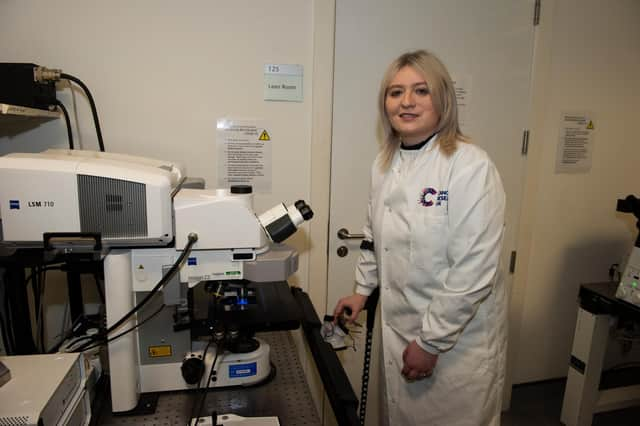East Dunbartonshire cancer survivor MP visits research facility close to her heart


The local SNP MP was just 19 years old when she was diagnosed with skin cancer.
On a fact-finding mission, Ms Callaghan met with leading researchers at the Cancer Research UK site who gave an insight into the work they are doing to help the charity achieve its mission to see more people survive the disease.
Advertisement
Hide AdAdvertisement
Hide AdMs Callaghan, who has been cancer-free since 2014, said: “The life-saving work Cancer Research UK scientists are doing here at the Beatson Institute is crucial.
“One in two of us will get cancer and so medical research charities like Cancer Research UK are the life blood of research and development.
“The charity’s mission is clearly one that’s close to my heart. It’s been incredible to discover that thanks to the generosity of its supporters, Cancer Research UK’s work into the prevention, diagnosis and treatment of cancer has been at the heart of progress that has seen survival in the UK double in the last 40 years.”
Amy was diagnosed with melanoma in 2011 when she was aged just 19, after noticing a lump on the inside of her left cheek. She had surgery to remove the lump, but three years later the cancer came back. After another successful round of surgery to remove another small lump in her cheek, she has been cancer-free for 7 years.
Speaking about her experience, Amy said:
Advertisement
Hide AdAdvertisement
Hide Ad“I feel very fortunate that my cancer was picked up early and removed quickly, after I noticed that something wasn’t quite right. But I remember leaving hospital and realising that my life would never be the same again.
“It took years to rebuild my confidence, but I’m fighting on. I am more determined than ever to do what I can to help others affected by this cruel disease.
“A decade on from my cancer diagnosis, I’m in no doubt that the work of Cancer Research UK scientists is at the heart of helping more people like me survive.”
Around 32,300 people are diagnosed with cancer each year in Scotland.*
Advertisement
Hide AdAdvertisement
Hide AdLast year, Cancer Research UK invested nearly £30m in Scotland in vital research. With around 40,000 people expected to be diagnosed with cancer in Scotland every year by 2035, the charity is calling on the UK and Scottish Governments to work in partnership with the whole life sciences sector, to ensure that investment in research prioritises cancer.
This will help to achieve both governments’ ambitions for early diagnosis, which is key to improving cancer survival rates.
Amy said: “My experience means I understand the importance of Cancer Research UK’s work all too clearly.
“As a result of the pandemic, cancer is as urgent an issue now as it’s ever been. Just as science is our route out of the pandemic, science is our route to beating cancer.
Advertisement
Hide AdAdvertisement
Hide Ad“I’m so impressed that it’s public generosity that makes this life-saving work possible – we can all support the ground-breaking research being carried out on our doorstep.”
On her visit, Amy met with Beatson Institute director Professor Owen Sansom. He explained that while COVID-19 had a significant impact on the research activity at the Beatson Institute last year, researchers were still able to publish and contribute to 133 research papers in 2020.
During her tour, Amy saw first-hand how scientists at the Beatson Institute are harnessing the immune system to attack many different types of cancer, as well as finding new ways to diagnose cancer early.
Professor Sansom said: “We were pleased to welcome Amy Callaghan to the Beatson Institute and explain how our scientists are playing a part to beat cancer.
Advertisement
Hide AdAdvertisement
Hide Ad“Her own personal experience is an important reminder to all of us here that scientific research holds the key to saving more lives from cancer.
“This past year proves, more than any other, the value of research and what can be achieved together. Thanks to our incredible supporters, we are more focussed than ever on our ambition of seeing 3 in 4 people survive their cancer by 2034.”
Play a part in supporting life-saving research at cruk.org.